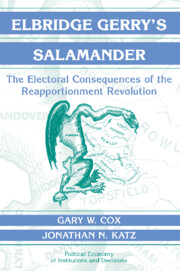Book contents
- Frontmatter
- Contents
- List of Tables and Figures
- Preface
- Part I Introduction
- Part II Democrats and Republicans
- Part III Incumbents and Challengers
- 8 The Growth of the Incumbency Advantage
- 9 Candidate Entry Decisions and the Incumbency Advantage
- 10 Redistricting and Electoral Coordination
- 11 Redistricting, the Probability of Securing a Majority, and Entry
- 12 Reassessing the Incumbency Advantage
- Part IV Conclusion
- References
- Author Index
- Subject Index
- Titles in the series
9 - Candidate Entry Decisions and the Incumbency Advantage
Published online by Cambridge University Press: 10 November 2009
- Frontmatter
- Contents
- List of Tables and Figures
- Preface
- Part I Introduction
- Part II Democrats and Republicans
- Part III Incumbents and Challengers
- 8 The Growth of the Incumbency Advantage
- 9 Candidate Entry Decisions and the Incumbency Advantage
- 10 Redistricting and Electoral Coordination
- 11 Redistricting, the Probability of Securing a Majority, and Entry
- 12 Reassessing the Incumbency Advantage
- Part IV Conclusion
- References
- Author Index
- Subject Index
- Titles in the series
Summary
Previous studies of the incumbency advantage have focused on how much running an incumbent for reelection boosts the incumbent party's expected vote share. Incumbents, however, can decide whether to run for reelection, and their decisions are based partly on anticipation of the vote share they might win were they to run. Thus, while the presence of an incumbent may boost the incumbent party's vote share, forecasts of this vote share may determine whether there is an incumbent in the race to begin with.
All current measures of the incumbency advantage risk overestimating how much incumbency matters, by neglecting the possibility that incumbents tend to seek reelection when the prospects for their party are better, while retiring when those prospects are poorer. To the extent that incumbents are good at forecasting votes, one will find the incumbent party's vote share larger when there is an incumbent (who correctly forecast the favorable vote and hence ran for reelection) and smaller when there is no incumbent (the incumbent having retired in the face of a bad expected vote, which the nonincumbent replacing her to some extent inherits). In technical terms, the argument just given amounts to saying that there is a species of simultaneity bias afflicting current measures of the incumbency advantage.
It is not just incumbents' entry strategies that pose analytic challenges, however. When high-quality challengers (defined as those who have previously won elective office) enter the fray, they presumably do so partly on the basis of favorable vote forecasts. Their decisions to enter accordingly may bias estimates of how much the presence of a strong challenger boosts the challenging party's vote share.
- Type
- Chapter
- Information
- Elbridge Gerry's SalamanderThe Electoral Consequences of the Reapportionment Revolution, pp. 140 - 161Publisher: Cambridge University PressPrint publication year: 2002



